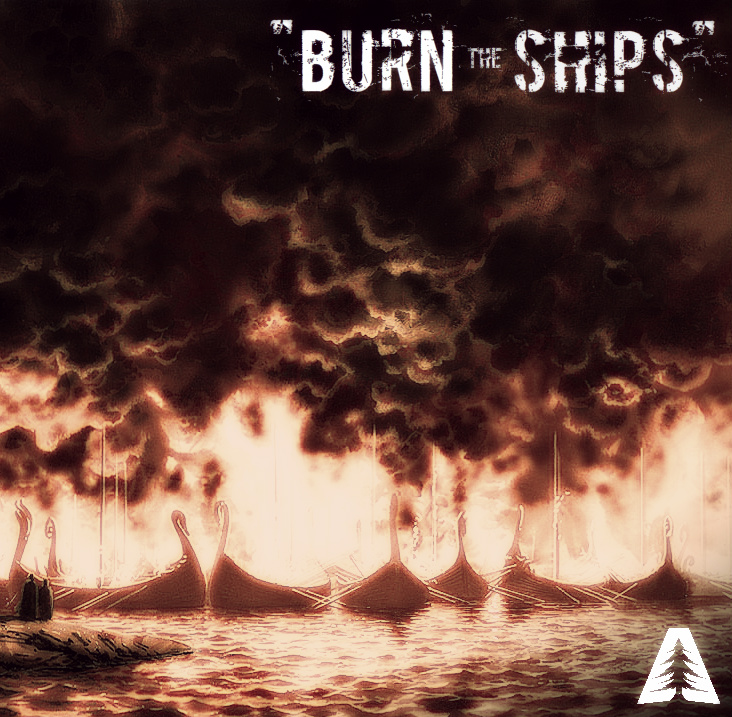Often, we are asked where the name “Burn the Ships” comes from. To us, it’s a personal mantra; a statement about the willingness to put forth everything to achieve victory.
The act of burning one’s own ships is the physical manifestation of this idea; a tactic that military commanders throughout history have used to overcome the challenges that made everyone before them simply avoid the venture. Thus, we found ourselves - both as military commanders and entrepreneurs - inspired by the words, “Burn the Ships.”
With that, I want to share with you why this statement has meaning; the many stories that have made the firing of masts, hulls and sails into a bold ideology (and incredible ale). This, ladies and gentlemen, is the story of “Burn the Ships.”
Flamborough Head, 1779
Throughout the American Revolution thus far, the Patriot navy is severely lacking. Short on raw materials, shipyards and able crewmen, the newly formed United States is finding it difficult to raise a suitable force to combat the overwhelming might of Britain's superior navy; the most powerful in the world.
One recent immigrant to the colonies, a Scottish-born sailor by the name of John Paul Jones, travels hastily to Philadelphia late in 1775 to enlist in the new Continental Navy.
Jones had been an officer on British merchant and military vessels for years, but had been expelled from service due to his bold and radical command style. He was known to challenge authority; often developing his own campaigns that proved to be far riskier than his commanders wished. Jones, however, knowing himself to be able and the potential rewards of his plans to be fruitful, saw risk as irrelevant. Furthermore, on the rare occasion that a sailor member spoke out against him or attempted to rally mutiny, he would single-handedly beat them in front of an audience of the entire crew. Jones knew how to win, and did not tolerate those who doubted it.
On the eve of his court martial in England, he left behind his fortune and fled to America; a land he admired due to its ripe opportunities and just cause of individual freedom.
Jones was assigned command immediately, and spent 1776 combating the British and capturing their supply ships along the east coast of the America’s from Nova Scotia to the Bahamas. However, his successes would once again become clouded by his command style. Following a heated debate with his commander, Commodore Hopkins, the unpredictable Jones was removed from the main combat zone; assigned a lesser command over a smaller ship - the USS Ranger - and ordered to sail to France and assist with the American cause, "however possible."
Upon arrival in France, Jones develops a strong friendship with Benjamin Franklin, who is overseas attempting to negotiate an alliance with King Louis XVI. Franklin encourages the young captain, aged just 29 years at the time, to do whatever he saw fit in aiding the American cause.
The rambunctious Jones wastes no time. With his small, 18-gun vessel he begins a relentless campaign in the waters surrounding Britain throughout 1777 and 1778. Harassing merchants, seizing cargos, he begins his independent campaign to make the British feel that this was not confined to the colonies a world away. He even leads a bold raid on the port town of Whitehaven - where years before Jones had begun his career as a seaman. He burns hundreds of English ships at harbor, covertly spikes cannons within English fortifications, captures droves of British soldiers and seamen, all while seizing English supplies, goods, arms, and even the occasional British warship. Jones, by his own initiative, has successfully brought the “war in the colonies” home to millions of British citizens, who are now beginning to question whether or not this war is worth fighting.
1779 brings a change to the war. France has officially aligned itself with the United States, and Jones now has the support of the French Navy. He takes command of a new, 42-gun warship, naming her the Bonhomme Richard in honor of his friend, Benjamin Franklin, whose internationally famous “Poor Richard’s Almanac” is published in France under the title “Les Maximes du Bonhomme Richard.”
In the fall, Jones takes back to the seas, leading a small squadron around Scotland’s northern coast and down into the North Sea. Now holding the reputation of a violent privateer in Britain, word of his presence causes instant panic in towns along the entirety of the English eastern shore. Yet, Jones simply lies in wait for an opportunity to present itself.
That opportunity comes on September 23rd.
In the afternoon, his watchmen spot a merchant convoy making their way down the coast, protected by two British warships; the 22-gun HMS Countess of Scarborough and the massive, 50-gun frigate HMS Serapis, commanded by the prominent and highly decorated Captain Richard Pearson. Jones pursues them, engaging the fleet just before sunset in the waters just off the impressive cliff faces of Flamborough Head in Yorkshire.
At 7pm, the battle commences as Richard and Serapis open up on one another with full broadsides. The French vessels, Alliance and Pallas are successfully lured downwind by the Countess, leaving Jones alone to battle the superior vessel.
During the initial barrage, Jones discovers that his new 18-pound cannons - the largest guns he has aboard - are defective, as one explodes during the firing of its first round. Now, at close range, the Richard, both out-gunned and out-maneuvered by the Serapis, is being ripped apart by successive volleys. Jones, attempting to remain in the fight, finds her increasingly less responsive as she begins to burn uncontrollably.
Rather than retreat or surrender to save his ship, and thus the lives of himself and his men, Jones decides to commit what little Bonhomme Richard has left. At close quarters, Serapis makes another broadside pass, further ravaging the burning, listing Richard. Captain Pearson shouts to Jones, demanding he strike his colors and surrender. Without hesitation, Jones yells back to Pearson with raging fervor:
“I have not yet begun to fight!”
He turns the Richard directly at Pearson’s stern. This move brings him even closer to Serapis, and thus her powerful broadside guns, but this is exactly what the motivated commander wants: to take the directly fight to them.
Upon impact against her hull, Jones personally leads his men in lashing the Richard to the Serapis. Under fire from the British decks, Captain and crew hastily bind the two vessels together with heavy rope while simultaneously fighting off British marines.
Witnessing the unthinkable, Pearson experiences his first moment of dread since the start of the battle. He immediately orders his men to drop anchor in hopes that the sudden shift in momentum will tear the Richard loose.
Yet, the knots hold strong.
Rather than ripping apart as the anchor catches, the two ships begin to spiral together as if in a waltz. Side by side, bow to stern, gun to gun, the Richard and Serapis spin as men on both sides exchange small arms fire. Serapis’ cannons continue to rip through Richard’s lower decks; the damage is so bad that many rounds simply pass clear through the hull. Yet, despite the dire situation, Jones and his men refuse to quit.
Throughout the violent deterioration of their floating fortress, Jones’ men fight with a renewed tenacity. They hold the the British off, and begin to shift the momentum of the battle.
The Patriots begin to overwhelm Pearson’s crew, forcing British sailors and marines to abandon their posts as they tenaciously fight aboard from broadside on the decks, and from above on the masts and lines.
Pearson and his men begin to wear; their will irreparably damaged by the unthinkably reckless tactics of the Americans. Captain Pearson, staring at Richard’s burning wreckage securely tied to his vessel’s hull, and now witnessing Jones’ men overwhelming his crew as they pour aboard, decides he has had enough. He hastily cuts down his own colors, signaling surrender and thus an end to the battle. The British lay down their rifles, and their ships powerful guns go silent.
In the aftermath, Jones quickly transfers his remaining men to the Serapis, imprisons Pearson’s crew below deck, and orders the burning wreckage of Bonhomme Richard cut loose. She quickly disappears beneath the waves, leaving only the sound of extinguishing flames.
John Paul Jones, now Captain of the Serapis, sails her to port; his trophy for gambling everything they had on the will, determination and ability of he and his men in the midst of overwhelming odds. By remaining in the fight - and thus, allowing Richard to continue burning - Jones placed himself and his crew in a situation of no return. They would either take the enemy ship by force, or perish in the cold waters of the coast of Flamborough Head.
His defiance of defeat - and complete commitment to victory - makes Jones a celebrity overnight. He has defeated a leading British naval commander, and captured his superior frigate. It is after this victory that John Paul Jones becomes the man widely accepted as the “Father of the United States Navy;” a title he holds to this day.
“Burn the Ships” is a mantra about refusing to give in to defeat, especially when the odds are stacked against you. In accepting that failure was not an option, forcing themselves to give every ounce of strength, ingenuity and drive they possessed, Jones and his men gave us a great example of what “Burn the Ships” means to us...and one hell of a story to share over a beer.
Read on:
Chapter 3
Chapter 4
Chapter 5
Chapter 6
-Carl
Owner | Engineer | Brewer




























